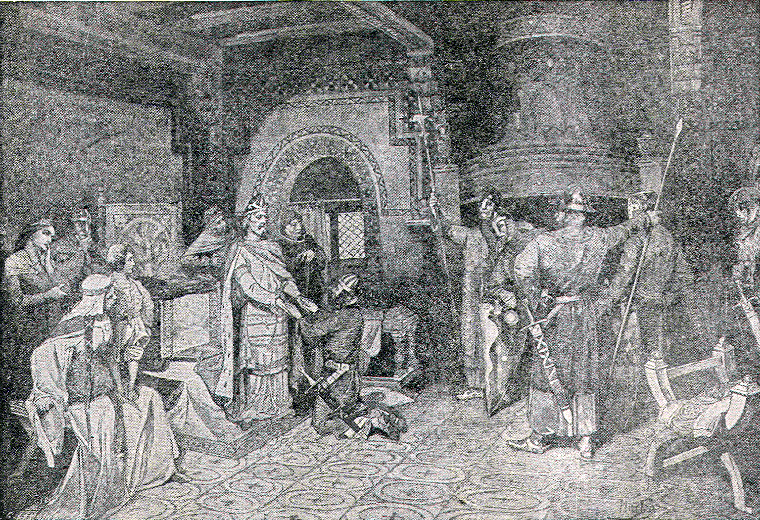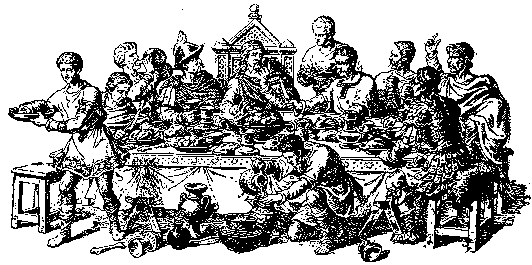Story of the Middle Ages - S. B. Harding |
Rise of Feudalism
There seemed to be only one remedy against these evils for the ordinary freeman. This was to give up his independence, and get the lord of some castle to agree to protect him against all other enemies. That, in fact, is just what we find going on in this period. Men everywhere were giving up their independence, and becoming the dependents of some great man who took them under his protection.
When a freeman wished to "commend himself," as it was called, to the protection of a lord, he went down on his knees before him, put his hands between the hands of the lord, and swore to be "his man"—that is, to serve him. Then the lord raised his "vassal," as the man was thenceforth called, and gave him the kiss of peace. This was called "doing homage" to the lord. Next the vassal swore to be faithful to his lord in all things; this was the "oath of fealty."
 A VASSAL DOING HOMAGE TO HIS LORD. |
If the man had land in his own right, he usually gave it up to the lord, and the lord then gave him back the use of it. If he had no land before, the lord granted him the use of some of his own land; and a lance, or a twig, was given him at the time he did homage, in sign of this. Thenceforth the lord was the real owner of the land, but the vassal had the use of it till his death. When he died, his son would do homage and swear fealty to the lord, and then he would be given the land his father held. Such a piece of land was called a "benefice" or a "fief," and the name which is given to the whole system was "feudalism," or the "feudal system."
As a result of this system the ordinary freemen gained the protection which they so much needed and the state could no longer furnish. Thenceforth they had a place of refuge, in the lord's castle, to which they could flee when robber bands appeared; and they also had a powerful protector to defend them against the attacks of other lords.
"But," you may ask, "what good was all this to the lord of the castle? Why was he willing to admit these men to become his vassals, and even grant them parts of his own lands as benefices?" That is a question which is easily answered. The lord needed men to help him guard his castle, and fight his battles; and that was what the vassals supplied. Every year they might be called upon to serve their lord as armored knights for forty days in the field, besides rendering him other services. In this way the lord obtained military followers, who were closely bound to him by ties of homage and fealty; and the more vassals he had, the more powerful he became.
The lords themselves in turn often became the vassals of some greater lord above them, and bound themselves to bring all of their followers to serve him, when called upon to do so. In the completed system, the king of the land stood at the head; then under him were his vassals, and under them were their vassals,—and so on until we come down to the peasants. They were not looked upon as worthy to be the vassals of anybody; they were called "serfs" or "villains," and had to till the soil, and raise the food which supported all the classes above them.
 LORD AND DEPENDENTS FEASTING |
From what you have been told you might think that feudalism was an organization only for fighting; but it was something more than this. It came to be an organization for governing the land as well. The power of the kings became so weak that the feudal nobles were able finally to take into their own hands most things that the head of the state ought to have done. In this way it came about that the feudal lords had the right to make war, coin money, make laws, and hold courts in their fiefs. Sometimes they had their own gallows on which to hang offenders. The power that ought to have been in the hands of the head of the state was thus split up into many bits, and each of these great lords had part of it.
The growth of the feudal system was going on everywhere in Western Europe from about the eighth to the eleventh centuries. It grew slowly, but it grew surely; for in the weakened condition of the state it was the form of organization that best met the needs of the people. So everywhere,—in Spain, in France, in England, in Germany, and in Italy—we find the feudal castles arising; and men everywhere gave up their free land, received it back as fiefs, and became the vassals of lords above them.
The existence of feudalism is one of the most important facts about the Middle Ages. It is this which makes the government of that period so different from the governments of Greece and Rome, and also from the governments of to-day. Feudalism, moreover, led to other important changes. In the Church it made the abbots and bishops the vassals of the kings and nobles for the land which the Church held; and since vassals owed military service, the bishops and abbots often became more like feudal warriors than mild and holy servants of Christ. Because the chief business of vassals and lords was fighting, much attention was paid to arms and armor, and to training for war. In this way arose the wonderful coats of mail and suits of armor of the Middle Ages; in this way also arose the long training which one had to go through to become a knight, and the exciting "tournaments" in which the knights tried their skill against one another.
In another chapter is an account of The Life of the Castle; we tell you of these things here only that you may see how truly we may say of this period, that it was indeed the Feudal Age, as it is sometimes called. Especially is this true of the eleventh, twelfth, and thirteenth centuries. It is in those centuries preeminently that we find feudalism grown into a complete system, and ruling the whole life of the lands which the German conquerors had won from the Roman Empire.